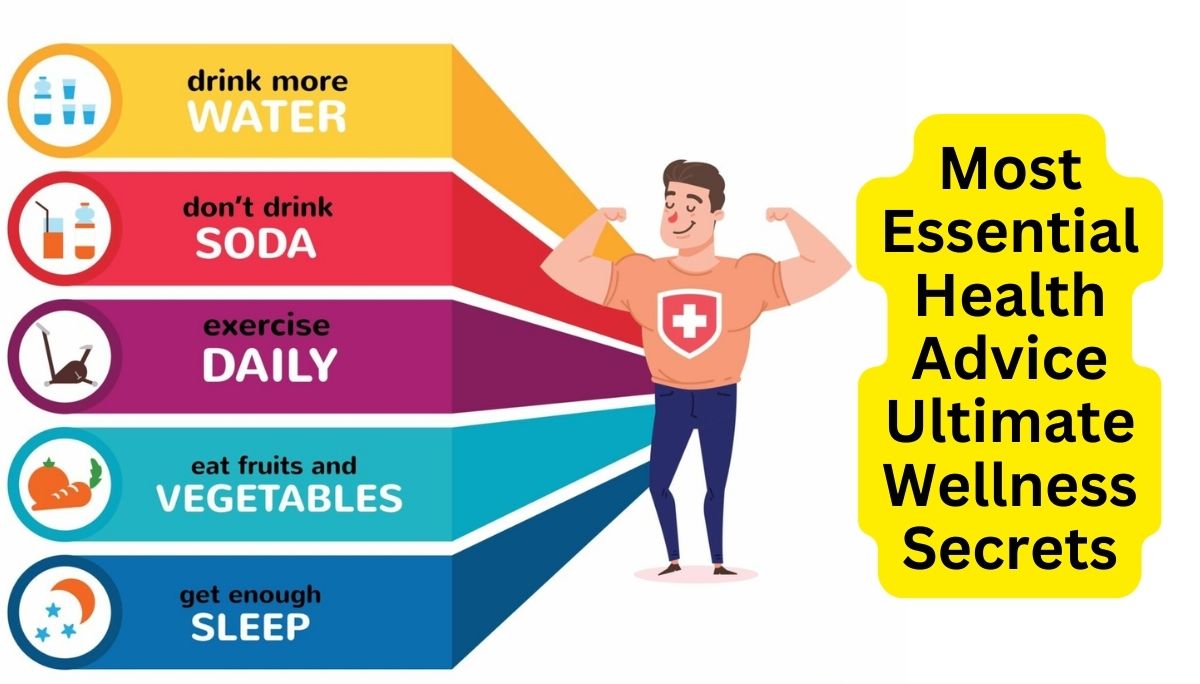Most Essential Health Advice You Need to Know – Know The Ultimate Wellness Secrets and Discover Timeless Health Advice for Optimal Well-Being
In a world filled with conflicting health information, finding the best advice for optimal well-being can be overwhelming. However, certain timeless principles stand the test of time and form the foundation of a healthy lifestyle. In this comprehensive guide, we’ll explore the best health advice you can give someone, backed by science and expert recommendations.

Table of Contents
Introduction
Taking care of our health is one of the most important investments we can make in life. Our physical and mental well-being plays a crucial role in our overall happiness, productivity, and quality of life. With so much information available, it can be overwhelming to determine the best health advice. However, by following a few simple yet effective guidelines, you can lay the foundation for a healthier and more fulfilling life.
Eat a Balanced Diet
A balanced diet is the cornerstone of good health. Aim to incorporate a variety of nutrient-dense foods, including fruits, vegetables, whole grains, lean proteins, and healthy fats. This combination provides your body with the essential vitamins, minerals, and macronutrients it needs to function optimally. Additionally, limit your intake of processed foods, added sugars, and unhealthy fats, as they can contribute to various health issues.
One great resource for healthy eating tips is the Harvard Nutrition Source, which offers evidence-based guidance on creating a well-rounded diet.
Stay Hydrated
Water is essential for life, and proper hydration plays a vital role in numerous bodily functions, including temperature regulation, nutrient transportation, and waste elimination. Aim to drink at least eight glasses of water per day, and more if you engage in physical activity or live in a hot or humid environment. Staying hydrated can improve your energy levels, cognitive function, and overall health.
Exercise Regularly
Regular physical activity is crucial for maintaining a healthy weight, reducing the risk of chronic diseases, and promoting overall well-being. Aim for at least 150 minutes of moderate-intensity exercise or 75 minutes of vigorous exercise per week. This can include activities such as brisk walking, swimming, cycling, or strength training. Exercise not only benefits your physical health but also has a positive impact on your mental well-being by reducing stress and improving mood.
Prioritize Sleep
Sleep is often overlooked but plays a vital role in our overall health and well-being. Aim for seven to nine hours of quality sleep each night. Adequate sleep helps to restore energy, promote healing, and support cognitive function. Establish a consistent sleep routine, create a sleep-conducive environment, and avoid screens before bedtime to improve your sleep quality.
Manage Stress
Chronic stress can have a profound impact on both your physical and mental health. It can contribute to various issues, including high blood pressure, anxiety, and depression. Find healthy ways to manage stress, such as practicing relaxation techniques, engaging in physical activity, or seeking support from friends, family, or a mental health professional. By prioritizing stress management, you can improve your overall well-being and reduce the risk of stress-related health problems.
Practice Mindfulness
Mindfulness is the practice of being present and fully engaged in the current moment. It can help you cultivate a greater sense of awareness, reduce stress and anxiety, and improve overall well-being. Incorporate mindfulness practices into your daily routine, such as meditation, deep breathing exercises, or mindful movement like yoga or tai chi. These practices can help you feel more grounded, focused, and connected to the present moment.
Frequently Asked Questions: Most Essential Health Advice
Q: What is the best way to start a healthy lifestyle?
A: Start by making small, sustainable changes to your diet and exercise routine. Gradually incorporate more fruits, vegetables, and whole grains into your meals, and find physical activities that you enjoy. Consistency is key, so focus on building healthy habits over time.
Q: How much water should I drink daily?
A: The recommended daily water intake varies based on factors such as age, gender, activity level, and climate. However, a general guideline is to drink at least eight 8-ounce glasses (approximately 2 liters) of water per day. Listen to your body’s thirst cues and adjust your water intake accordingly.
Q: How can I improve my sleep quality?
A: To improve your sleep quality, establish a consistent sleep schedule, create a sleep-conducive environment (cool, dark, and quiet), and develop a relaxing bedtime routine. Avoid screens and caffeine close to bedtime, and consider practicing relaxation techniques like deep breathing or meditation to calm your mind.
Q: What’s the most important health advice?
A: Prioritizing sleep, eating a balanced diet, staying hydrated, exercising regularly, managing stress, and maintaining social connections are all important aspects of overall health and well-being.
Q: How can I improve my overall health?
A: Focus on adopting healthy lifestyle habits such as eating nutritious foods, getting regular exercise, prioritizing sleep, managing stress, and nurturing social connections.
Q: What are some simple ways to live a healthier lifestyle?
A: Simple lifestyle changes such as eating more fruits and vegetables, staying active, drinking plenty of water, getting enough sleep, and finding healthy ways to manage stress can contribute to overall health and well-being.
Q: What are some effective stress management techniques?
A: Effective stress management techniques include exercise, meditation, deep breathing exercises, yoga, journaling, spending time in nature, and seeking support from friends or a mental health professional. Finding activities that help you relax and decompress can significantly reduce stress levels.
Remember, good health is a journey, not a destination. By incorporating these simple yet effective practices into your daily life, you can embark on a path towards better physical and mental well-being. Consistency and patience are key, and don’t hesitate to seek professional guidance if you need additional support.